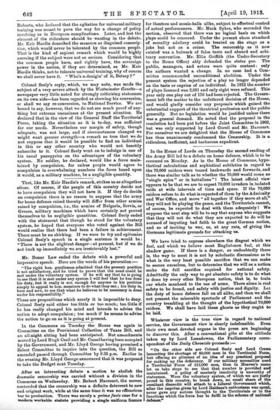Colonel Seely's reply, which, we may note, was made the
subject of a very severe attack by the Westminster Gazette—a newspaper very little noted for strongly criticising statesmen on its own side—has been regarded as showing his conversion, or shall we say re-conversion, to National Service. We are bound to say, however, that we do not see much prcof of any- thing but extreme uneasiness at the present situation. He declared that in the view of the General Staff the Territorial Force, taking the situation as it is to-day, was sufficient for our needs. Nevertheless our margin of safety, though adequate, was not large, and if circumstances changed we might want greater strength—a remark so true that we do not suppose that it would be possible to find an individual in this or any other country who would not heartily subscribe to it. Colonel Seely went on to indulge in one of his usual panegyrics on the advantages of the voluntary system. No soldier, he declared, would like a force main- tained by compulsion, for unless people would agree to compulsion in overwhelming numbers the force based upon it would, as a military machine, be a negligible quantity.










































 Previous page
Previous page